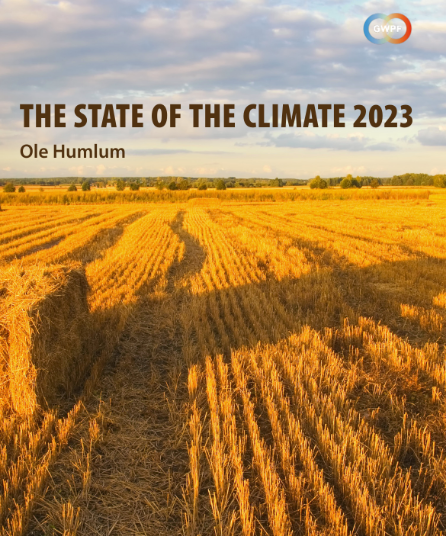| Klimatfakta.info |
2024-03-28
Klimatfacit 2023
Nu har den kommit. Ole Humlums stora rapport "The state of the climate". På 60 sidor går han igenom allmänt tillgängliga mätdata och ett fåtal som nyttjar modeller.
Innehåll: Pressmeddelande | Källor

Rapporten är gratis som pdf kan laddas ned. [1]
Observationerna redovisas i 7 avsnitt: atmosfären, oceanerna, havsnivån, havsis, snömängd, nederbörd och stormar. Han avslutar med.
Humlums avsikt är att presentera fakta så att läsaren kan bilda sig en egen uppfattning. Han lyckas redovisa fakta på ett så rimligt lättillgängligt sätt som är möjligt inom detta komplicerade område.
Läsare får tillräcklig kunskap för att lugna de som är klimatoroliga i onödan och erbjuder alarmisterna ett kraftfullt motstånd.
⇑ Pressmeddelande
Publ 2024-03-28
The State of the Climate 2023
Thursday 28th March 2024
London, 28 March — In his annual review of the state of the global climate, Professor Ole Humlum reviews last year's key data and observations in the context of long-term climate trends.
The review covers a wide range of temperature measurements in both ocean and atmosphere, alongside reviews of oceanic oscillations, sea level, snow and ice measurements and storms.
Professor Humlum draws attention to two oceanographic events that are likely to have driven up global temperatures in 2023:
"While global average surface air temperatures in 2023 were at record highs relative to long instrumental records (since 1850), they were driven up as a result of the still ongoing El Niño warming episode. In contrast, the two previous years, 2021 and 2022, were influenced by a cold La Niña in the Pacific Ocean. Thus the global surface air temperature record in 2023 continues to be significantly influenced by oceanographic phenomena."
The influence of the Hunga Tonga-Hunga Ha'apai eruption on 2023 meteorological conditions is still uncertain. The eruption, which occurred in the southern Pacific Ocean in January 2022, released an enormous plume of water vapour into the Stratosphere, but there is still uncertainty whether this event had any influence on atmospheric temperatures.
Professor Humlum said:
"The global climate system represents a multifaceted system, involving sun, planets, atmosphere, oceans, land, geological processes, biological life, and complex interactions between them. Many components and their mutual coupling are still not fully understood or perhaps not even recognised.
Believing that one minor constituent of the atmosphere (CO2) controls nearly all aspects of climate is naïve and entirely unrealistic. The global climate has remained in a quasi-stable condition within certain limits for millions of years, although with important variations playing out over periods ranging from years to centuries, or more, but the global climate has never been in a fully stable state without change. Modern observations show that this normal behaviour is also characterising recent years, including 2023, and there is no observational evidence for any global climate crisis."
⇑ Källor
Publ 2024-03-28
Mer att läsa
GWPFJudith Curry: Synen på klimatet (2024-05-05)
Klimatfacit 2023 (2024-03-28)
Ole Humlum
Vädret i december 2024 och 2023 (2025-01-17)
Lägre temperatur 2024 (2024-12-30)
Hur mycket stiger temperaturen fram till 2100? (2024-11-05)
Klimatfacit 2023 (2024-03-28)
Den globala temperaturen faller (2024-03-23)
Climate4you: Oktober 2022 (2022-11-19)
Climate4you Update May 2022 (2022-06-18)
Climate4you (2021-12-18)
Ole Humlum (2021-08-16)
Fotnoter
Klimatfakta
Adm: Hans Iwan Bratt, hibratt@gmail.se | 241012